
Top Features & Benefits of Java Mobile Application Development in 2023-2024
Rapid growth and transformation there have been great change in Java mobile applications over the years. With technological advances and the demand for good mobile solutions, Java has naturally taken off. The many benefits of Java mobile application development in 2023–2024 will be discussed in this blog.
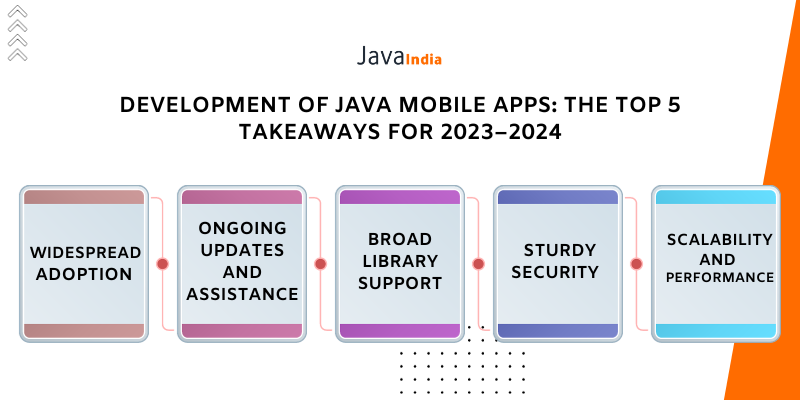
Development of Java Mobile Apps: The Top 5 Takeaways for 2023–2024
1. Widespread Adoption:
Because of its adaptability and independence from platforms, Java has been widely used in the mobile app development market. Because it works with so many other operating systems, including Android, it’s a great option for developers.
2. Scalability and Performance:
That’s why Java is an attractive option for developing mobile applications, with its superb performance and ability to handle large-scale programs. Features such as trash collection, JIT compilation and multi-threading make it both efficient and scalable.
3. Sturdy Security:
Security is an issue that must be considered when developing mobile applications. In terms of providing security, Java uses several different technologies such as encryption codes and a certificate-based authentication system to create an extremely stable structure. This also serves to prevent future attacks and ensure that vital information for users remains safe.
4. Broad Library Support:
Java already contains a comprehensive library and framework that enables programmers to produce interactive, diverse mobile applications. These libraries provide ready-made components and save developers a lot of time and grief.
5. Ongoing Updates and Assistance:
Java also has a dedicated community of developers who contribute to making it continually better, while helping other people. The language’s powers have been enhanced and its applicability in the world of mobile app creation is assured by constant upgrading to new versions.
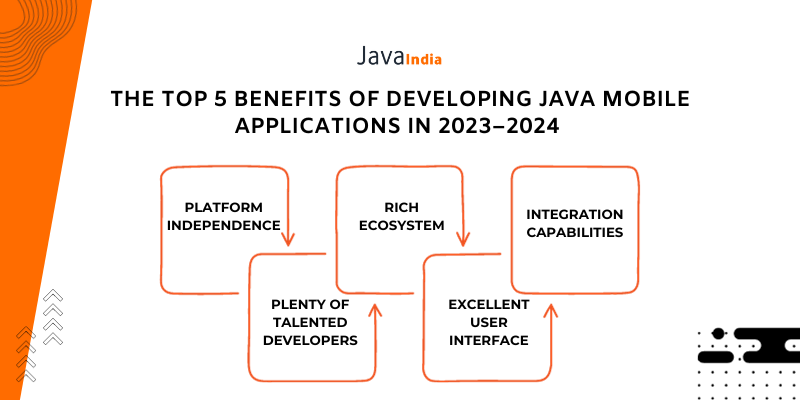
The Top 5 Benefits of Developing Java Mobile Applications in 2023–2024
- Platform Independence:
One of the great advantages of Java is platform independence. Developers can write code once and then deploy it to different platforms such as iOS, Android or others through technologies like Xamarin and Codename One. With Java Frameworks for Web Development as a result, there is no longer a need for distinct codebases, saving money and time during development.
- Plenty of Talented Developers:
Due to Java programming apps for Android’s long history, there is a large pool of talented Java programmers. It is now simpler for companies to locate and employ developers for their mobile app projects thanks to the availability of skilled individuals.
- Rich Ecosystem:
On the other hand, Java has an ecosystem of frameworks and libraries that makes developing mobile applications convenient. Developers can build applications that scale well and operate reliably using popular frameworks such as Spring and Hibernate. What’s more, community support and detailed documentation will facilitate the development process itself.
- Excellent User Interface:
Java comes with several frameworks and tools, such as JavaFX and Swing, that let programmers build interactive and aesthetically pleasing user interfaces. The wide range of customization & app development using Java possibilities provided by these tools guarantees mobile app users a flawless experience.
- Integration Capabilities:
Java is very usable for developing mobile applications that require a connection with other systems, because it will be compatible with all sorts of different platforms and technologies. The flexibility that Java provides makes integration with databases as well third-party APIs or backend systems seamless and quick.
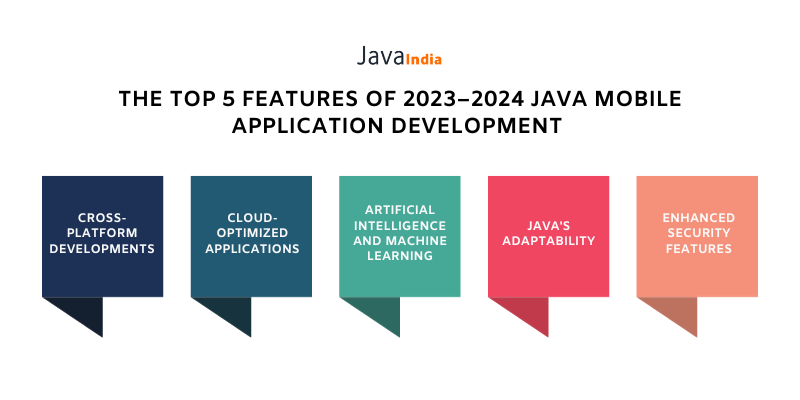
The Top 5 Features of 2023–2024 Java Mobile Application Development
- Cross-Platform Development:
With frameworks like React Native and Flutter, Java developers can create cross-platform mobile apps. This eliminates the need for independent development efforts and enables companies to contact customers across many platforms and appeal to a larger audience.
- Cloud-Optimized Applications:
Java provides the ability to create mobile apps that are optimized for the cloud, a feature that is becoming more and more popular as cloud computing gains traction. Testing tools for Java developers to create scalable and durable mobile applications, developers may make use of services like Google Cloud Platform (GCP) and Amazon Web Services (AWS).
- Artificial Intelligence and Machine Learning:
Libraries and frameworks related to artificial intelligence (AI) and machine learning (ML) also have very good support in Java. Developers can use these tools to integrate advanced AI and ML functionality in their mobile applications, which give users a much better experience with the intelligent capabilities available on phones.
- Java’s Adaptability
Java’s adaptability also extends to Internet of Things (IoT) integration, enabling developers to create mobile apps that easily establish connections with IoT devices. Java Web Development gives companies more opportunities to develop creative solutions that make use of mobile and IoT technology.
- Enhanced Security Features:
Java’s security features are always being updated to consider new threats and weaknesses. Benefits of Java mobile application development guarantee the security and integrity of mobile apps, developers. Furthermore, it make use of features like data encryption, safe coding techniques, and secure communication protocols.
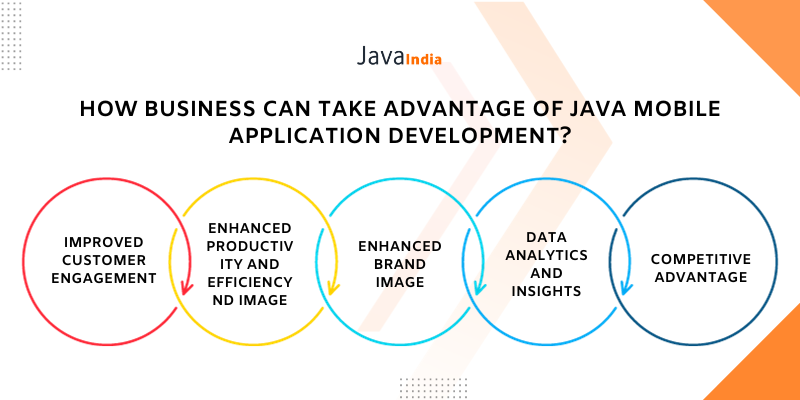
How Business Can Take Advantage of Java Mobile Application Development?
- Improved Customer Engagement:
Businesses may interact with customers more successfully by developing mobile apps using Java. Through interactive features, loyalty programs, or personalized alerts, Java mobile applications let companies forge closer bonds with their target market.
- Enhanced Productivity and Efficiency:
Java mobile apps improve productivity by streamlining corporate procedures. These applications increase worker productivity by automating repetitive operations, connecting with backend systems, and granting real-time data access. Java Frameworks for Web Development leads to better corporate results.
- Enhanced Brand Image:
A business’s brand image may be greatly improved by having a mobile application developed on Java that is both well-designed and functional. Benefits of Java mobile application development presents the business as forward-thinking, technologically sophisticated, and customer-focused, drawing in more customers and increasing brand loyalty.
- Data Analytics and Insights:
Businesses may get a greater understanding of consumer behavior, preferences, and trends by using Java mobile apps to collect and analyze important user data. These insights may help firms make well-informed decisions and successfully customize their strategy to match client requests.
- Competitive Advantage:
Businesses may get a market advantage by investing in the creation of Java mobile applications. Businesses may set themselves apart from rivals and draw in a bigger portion of the target market by offering feature-rich, high-performing applications.
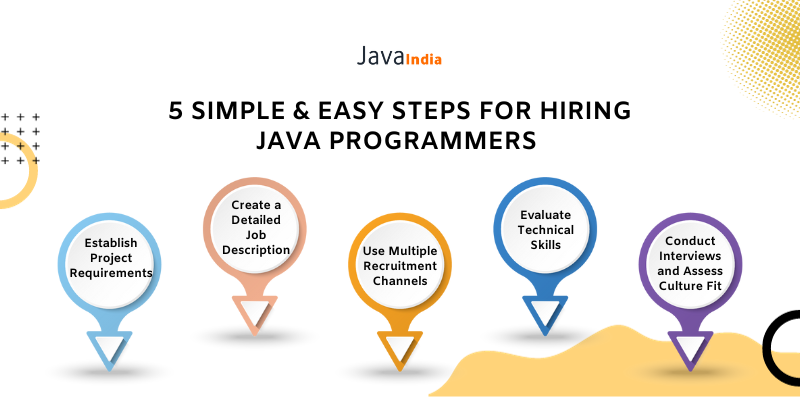
5 Simple & Easy Steps for Hiring Java Programmers
- Establish Project Requirements:
Clearly state the scope, budget, and schedule of the project. This will assist in bringing in the best applicants and establishing reasonable expectations.
- Create a Detailed Job Description:
Write a thorough job description that outlines the knowledge, expertise, and duties that are needed. Benefits of Java mobile application development provide the necessary Java technology , project skill -related frameworks, and libraries.
- Use Multiple Recruitment Channels:
To reach a larger pool of possible applicants, use a variety of recruitment channels, including job boards, social media sites, and professional networks. Enterprise Java Development Company makes it more likely that developers with the necessary skill set will be found.
- Evaluate Technical Skills:
To gauge a candidate’s proficiency with Java, do extensive technical evaluations, such as coding challenges or project assignments. This will assist in determining who is most suited for the position.
- Conduct Interviews and Assess Culture Fit:
Hold thorough interviews with applicants to gauge their technical proficiency, capacity for problem-solving, and compatibility with the company’s culture. Hire Java Developers to maintain a positive and effective working relationship, evaluating cultural fit is crucial.
Final Thoughts
In 2023–2024, creating Java mobile applications will provide several advantages for both companies and developers. Java makes it possible to create reliable and creative mobile apps, from increased security and integration capabilities to platform independence and scalability. Businesses may keep ahead of the competition, successfully engage clients, and spur company growth in the mobile-first era by adopting Java mobile app development. Thus, make use of Java’s possibilities and realize the full potential of developing mobile applications.
FAQ
Q. Why is Java suitable for mobile application development?
Ans. Java is a widely used flexible programming language that works on many platforms, making it ideal for developing mobile applications. It provides a stable, expandable ecosystem that assures accurate execution across various platform and device types.
Q. What does Java do to ensure platform independence for mobile app development?
Ans. Java implements the ‘ Write Once, Run Anywhere’ (WORA) principle to gain platform neutrality. JVMs (java virtual machines) allow any device to run mobile applications, so there is no need for unique codebases across platforms.
Q. What are the key advantages to using Java for Android app development?
Ans. Java is the official programming language for developing Android applications. It has numerous libraries and frameworks, a large developer community, high-quality documentation and is compatible with integrated development environments (IDE) like Android Studio.
Q. Can Java be utilized to build cross-platform mobile applications?
Ans. Of course, Java can also be used for cross-platform development with frameworks like Codename One and Xamarin. That means developers need only write code once, and it will run on different platforms.
Q. What kind of support does Java provide for multi-threading in mobile app development?
Ans. Since multi-threading has been built into Java, code can be written to create many concurrent tasks. This is essential for increasing the responsiveness and efficiency of mobile applications.
Q. Are there particular Java frameworks and libraries available for creating mobile apps?
Ans. Indeed, there are several Java frameworks and tools designed specifically for mobile development. The Android SDK for developing Android apps, JavaFX for creating cross-platform graphical user interfaces, and Apache Cordova for creating hybrid mobile applications are a few notable examples.

